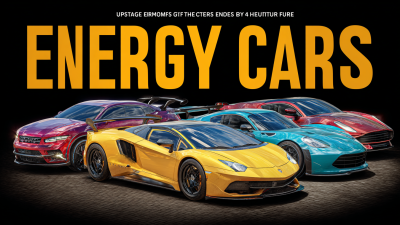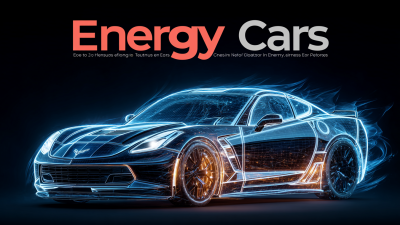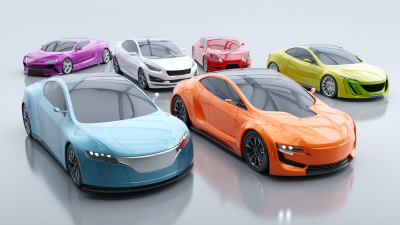Leave Your Message
As the world increasingly confronts the challenges of climate change and dwindling fossil fuel resources, the automotive industry is undergoing a profound transformation, spearheaded by the rise of Energy Cars. According to a report by the International Energy Agency (IEA), electric vehicle (EV) sales are projected to reach 25 million units globally by 2030, reflecting a growing preference for sustainable transportation solutions.

The market for Energy Cars is not merely a trend; it is a vital shift toward achieving carbon neutrality, with countries setting ambitious targets to phase out internal combustion engines. Innovations in battery technology, including advancements in solid-state batteries and longer-range capabilities, are making Energy Cars more appealing to consumers. In 2023, the best Energy Cars are not only enhancing performance and reducing emissions but also transforming public perception about sustainability in transportation. This article explores the most promising vehicles that are leading the charge in a greener future.
In 2023, the automotive landscape is witnessing a remarkable transformation with the rise of innovative electric vehicles (EVs) that are leading the charge toward eco-friendly travel. These cutting-edge cars utilize advanced technologies to minimize environmental impact while offering enhanced performance and convenience. From sleek sedans to rugged SUVs, the variety of options available caters to diverse consumer needs, making sustainable driving more accessible than ever.
A key factor in this shift is the integration of sustainable materials and manufacturing processes, which further reduces the carbon footprint of these vehicles. Many EVs now come equipped with features like regenerative braking and energy-efficient driving modes that enhance their sustainability without compromising on power and comfort. This transformation in transportation not only promises to decrease reliance on fossil fuels but also fosters a new era of responsible mobility, paving the way for a greener future.
The future of green mobility is being shaped by revolutionary hybrid models, marking a significant shift towards sustainable transportation. In 2024, electric vehicles (EVs) accounted for only 2.5% of all car sales in India, highlighting the challenges faced in making a larger impact. High prices and limited charging infrastructure deter potential buyers, but trends suggest a forthcoming surge in adoption as companies circle around innovative technologies and eco-friendly designs. According to various industry reports, the global EV market is expected to witness substantial growth, driven by advancements in hybrid technology and increasing consumer awareness of environmental issues.
In Europe, the green revolution is accelerating, reflected in a remarkable 55% rise in electric and hybrid vehicle registrations in Albania this year. This growth indicates a broader acceptance and integration of green transport solutions, underscoring the necessity of urban planning and smart mobility initiatives. Moreover, the unveiling of next-generation hybrid powertrains at major auto shows signals a push toward innovative solutions that combine the efficiency of electric motors with traditional internal combustion engines. As cities prepare for an influx of electric vehicles, the emphasis on sustainable practices and infrastructure development has never been more critical to ensure a seamless transition to a greener future.

The landscape of sustainable transportation is rapidly evolving, particularly with advancements in battery technology that are enhancing energy efficiency in electric vehicles (EVs). Innovations such as structural batteries are making vehicles lighter, effectively reducing energy consumption while maintaining performance. This approach not only maximizes range but also paves the way for integration into various electronic devices, revolutionizing how we think about energy storage and consumption.
**Tips:** When considering an EV, look for models that utilize cutting-edge battery technologies. These vehicles often provide the lowest cost per mile due to optimized energy efficiency and longer ranges, making them a smart investment for eco-conscious drivers. Also, keep an eye on manufacturers that prioritize vertical integration and automated production processes, as these methods are shown to improve overall battery performance and reduce costs.
In addition to these technological advancements, the race for superior battery efficiency is fiercer than ever. Breakthroughs that extend ranges to over 3,000 miles on a single charge are becoming more common, positioning EVs as a viable alternative to traditional vehicles. As these innovations become standard, they are set to play a crucial role in addressing carbon emissions and making sustainable transportation accessible to all.
| Model | Type | Range (miles) | Battery Capacity (kWh) | Efficiency (MPGe) | Charging Time (hours) |
|---|---|---|---|---|---|
| Model A | Electric | 350 | 75 | 130 | 8 |
| Model B | Hybrid | 600 | 50 | 90 | 5 |
| Model C | Electric | 400 | 100 | 120 | 6 |
| Model D | Plug-in Hybrid | 500 | 30 | 75 | 2 |
| Model E | Electric | 300 | 60 | 100 | 7 |
The landscape of sustainable transportation is rapidly evolving, with innovative design and eco-friendly materials paving the way for next-generation vehicles. Car manufacturers are increasingly prioritizing sustainability not just in their powertrains but also in the very components and materials that make up the vehicles. Lightweight materials like carbon fiber and recycled plastics are becoming common, reducing overall weight and increasing energy efficiency. This shift not only helps in conserving resources but also enhances the performance of these vehicles, making them more appealing to eco-conscious consumers.
 When considering a sustainable vehicle, look for options that utilize renewable resources in their production. For instance, car interiors made from natural fibers, such as hemp or wool, contribute to a lower carbon footprint. Additionally, check if the vehicle's manufacturing process adheres to strict environmental standards. This not only ensures a lesser impact on the planet but often results in superior craftsmanship and attention to detail.
When considering a sustainable vehicle, look for options that utilize renewable resources in their production. For instance, car interiors made from natural fibers, such as hemp or wool, contribute to a lower carbon footprint. Additionally, check if the vehicle's manufacturing process adheres to strict environmental standards. This not only ensures a lesser impact on the planet but often results in superior craftsmanship and attention to detail.
Moreover, many manufacturers are now integrating advanced technologies that promote sustainability. From regenerative braking systems to solar panels on vehicle surfaces, these innovations are at the forefront of transforming traditional cars into energy-efficient machines. As you explore your options, prioritize vehicles that incorporate these cutting-edge features, as they exemplify the future of sustainable transportation while ensuring you play a part in preserving the environment.
As electric vehicles (EVs) continue to gain traction, smart connectivity features are becoming a key differentiator for eco-conscious consumers. According to a report by McKinsey & Company, nearly 60% of consumers are willing to pay extra for enhanced connectivity features in their vehicles. This statistic underscores the growing expectation for technology integration in promoting not only convenience but also sustainable driving.
Advanced connectivity allows drivers to optimize their routes based on real-time traffic data and charging station availability. A report from Bloomberg New Energy Finance highlighted that, by 2025, the majority of EVs are likely to include advanced navigation systems that incorporate environmentally friendly driving patterns, contributing to reduced carbon footprints. Features such as over-the-air updates enable continuous improvement of vehicle performance and safety, further solidifying the appeal of energy-efficient cars.
Moreover, the integration of smart home technologies can streamline energy management for drivers. Vehicles equipped with smart connectivity can communicate with home energy systems to schedule charging during off-peak hours, as indicated by the International Energy Agency. This not only enhances the convenience of owning an EV but also aligns with the broader goals of energy efficiency and sustainability, making these cars a crucial part of the future transportation landscape.






